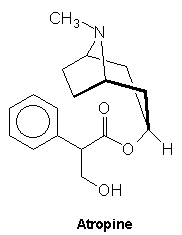
Atropine is my favorite organic compound because I would
like to become an optometrist. Atropine helps to dilate the eye in the setting
of an optometrist or ophthalmologist’s office. Dilation increases the size of
the pupil and allows a doctor to examine the important structures in the back
of the eye; such as the retina, optic nerve and various blood vessels.
History:
Atropine began its use in the middle ages, although not for doctoral
purposes. Woman in the middle ages used atropine to achieve an aesthetic
enhancement of their pupils. This could be the reason that the plant which atropine is
derived from, Atropa
belladonna, is partially translated into “beautiful woman,” this
plant is also more commonly known as Deadly Nightshade and is highly
toxic.
Other Uses:
This drug is also sometimes used for organophosphate
poisoning and can inhibit salivary and mucus glands.
Fun fact:
Atropine is considered a Tropane Alkaloid, another tropane
alkaloid is cocaine.
- Katilyn Wiggins
I really dislike getting my eyes dilated for one reason: I can't see the rest of the day. Other than that, I think it is wonderful that you are planning on being an optometrist, I will definitely come to you if I ever need new glasses/contacts.
ReplyDeleteBesides that, I never knew that the same substance used for dilating our eyes use to be used for aesthetics purposes. I can see why they would do that since back then there was no such thing as contact enhancement (also known as circle lens, etc.). The only thing I cannot imagine is walking around having difficulty seeing where I am going!